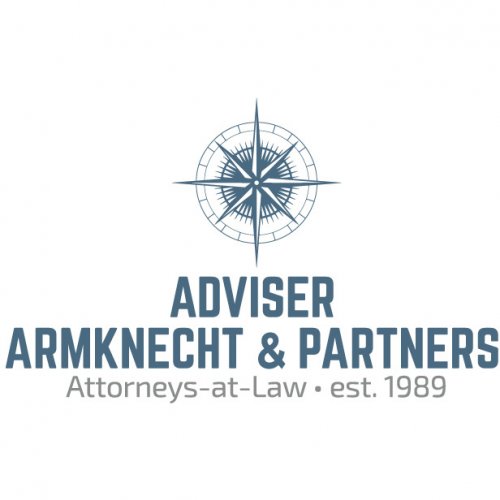Best Creditor Lawyers in Gdynia
Share your needs with us, get contacted by law firms.
Free. Takes 2 min.
List of the best lawyers in Gdynia, Poland
About Creditor Law in Gdynia, Poland:
Creditor Law in Gdynia, Poland refers to the legal framework that governs the rights and remedies of creditors, individuals or companies who are owed money, in the city of Gdynia, Poland. It includes regulations and procedures aimed at protecting the interests of creditors and ensuring fair debt collection.
Why You May Need a Lawyer:
There are several situations where you may need legal help in Creditor matters in Gdynia, Poland:
- Dealing with debt collection issues
- Disputes over unpaid debts or loans
- Bankruptcy and insolvency proceedings
- Negotiating settlements or repayment plans
- Enforcement of judgments and recovering owed money
Local Laws Overview:
When it comes to Creditor in Gdynia, Poland, several key aspects of local laws are particularly relevant:
- The Code of Civil Procedure: This law outlines the procedures for debt collection, including litigation and enforcement of judgments.
- The Bankruptcy and Reorganization Law: This law governs bankruptcy proceedings, including the rights and obligations of creditors.
- The Consumer Credit Act: This law regulates consumer credit agreements, protecting consumers from unfair practices and ensuring transparency.
- The Act on Payment Deadlines in Commercial Transactions: This law sets payment terms and penalties for late payments, promoting prompt payments between businesses.
- The Act on Enforcement Proceedings: This law establishes the procedures for enforcing court judgments and recovering owed money.
Frequently Asked Questions:
1. Can a creditor take legal action to recover a debt in Gdynia, Poland?
Yes, a creditor can take legal action to recover a debt in Gdynia, Poland. The process typically involves filing a lawsuit and obtaining a court judgment, which can then be enforced to collect the debt.
2. Can a creditor seize assets to satisfy a debt?
Yes, in certain circumstances, a creditor can seize assets to satisfy a debt. This usually requires obtaining a court order and following the procedures outlined in the Code of Civil Procedure.
3. Are there any limitations on debt collection practices in Gdynia, Poland?
Yes, there are limitations on debt collection practices in Gdynia, Poland. The law prohibits unfair or abusive practices, such as harassment, threats, or misleading debt collection tactics. Creditors must adhere to the rules outlined in the Act on Debt Collection.
4. What are the consequences of bankruptcy for creditors in Gdynia, Poland?
When an individual or company declares bankruptcy in Gdynia, Poland, creditors may face challenges in recovering the owed money. The bankruptcy proceedings and the priority of claims are determined by the Bankruptcy and Reorganization Law.
5. What are the time limits for debt collection in Gdynia, Poland?
The time limits for debt collection vary depending on the type of debt and the circumstances. Generally, civil claims have a limitation period of 10 years from the date the debt becomes due. However, it is advisable to consult a lawyer for specific advice regarding your situation.
Additional Resources:
- Ministry of Justice in Poland: www.ms.gov.pl
- National Chamber of Judicial Officers in Poland: www.krn.org.pl
- Polish Consumer Rights Association: www.psc.org.pl
Next Steps:
If you require legal assistance in Creditor matters in Gdynia, Poland, it is recommended to take the following steps:
- Gather all relevant documents related to the debt or issue.
- Consult with a reputable lawyer specializing in Creditor Law.
- Discuss your situation and explore potential solutions or strategies.
- Follow the guidance provided by your lawyer and proceed accordingly.
- Keep all communication and documentation related to your case organized and easily accessible.
Lawzana helps you find the best lawyers and law firms in Gdynia through a curated and pre-screened list of qualified legal professionals. Our platform offers rankings and detailed profiles of attorneys and law firms, allowing you to compare based on practice areas, including Creditor, experience, and client feedback.
Each profile includes a description of the firm's areas of practice, client reviews, team members and partners, year of establishment, spoken languages, office locations, contact information, social media presence, and any published articles or resources. Most firms on our platform speak English and are experienced in both local and international legal matters.
Get a quote from top-rated law firms in Gdynia, Poland — quickly, securely, and without unnecessary hassle.
Disclaimer:
The information provided on this page is for general informational purposes only and does not constitute legal advice. While we strive to ensure the accuracy and relevance of the content, legal information may change over time, and interpretations of the law can vary. You should always consult with a qualified legal professional for advice specific to your situation.
We disclaim all liability for actions taken or not taken based on the content of this page. If you believe any information is incorrect or outdated, please contact us, and we will review and update it where appropriate.








